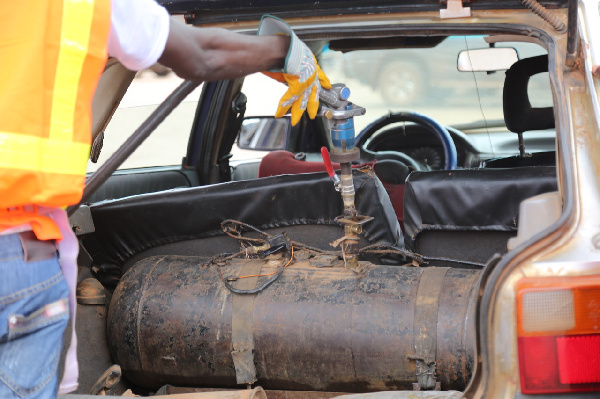
Is it legal for vehicles to be fitted with LPG cylinders?
Dear Mirror Lawyer, For some time now, I have been observing many vehicles, especially in the commercial sector trooping to LPG stations to fill liquefied gas into cylinders fitted in their vehicles.
Advertisement
I consider this to be dangerous in view of the inflammable nature of liquefied gas. Is it legal for such vehicles to be fitted with LPG cylinders and use the liquefied gas as an alternative source of fuel to power their vehicle engines?
Joseph Thompson, Asylum Down
LPG cylinders
Dear Joseph, Liquefied petroleum gas (LPG) and petrol are all highly inflammable substances which are used to power motor vehicle engines. LPG is also referred to as butane and propane gas or auto gas in motoring circles.
It is the by-product of the processing of natural gas liquids, as well as the refining of crude oil. In the early years of crude oil refining, it was deliberately burnt off and wasted. With research and advancement in technology, it is now recognised as a versatile low-carbon fuel and used productively as liquid gas fuel for a variety of purposes, including powering cars.
So, in modern times, most petrol cars can be fitted with an LPG conversion, turning the vehicles into dual-fuel cars that can run on LPG, as well as petrol.
LPG is safe because it is clear gas that turns to liquid when subjected to pressure or cooling, making it possible to be stored in tanks in a vehicle. It is the third most popular automotive fuel in the world, with approximately 16 million of 600 million passenger cars powered using the fuel.
Global warming
For global warming or climate change activists, the advent of LPG is welcomed as it is widely used as a green fuel which reduces carbon dioxide (CO2) exhaust emissions, the primary driver of global climate change by around 15 per cent compared to petrol.
Ghana has a law that regulates the use of LPG in vehicles. Rules 57 & 58 of the Road Traffic Regulations, 2012 (L.I. 2180) provides that a person shall not drive or own a motor vehicle fitted or manufactured to run on liquefied petroleum gas or compressed natural gas, liquefied petroleum gas or compressed natural gas and petrol, or liquefied petroleum gas or compressed natural gas and diesel unless the motor vehicle has been registered by the Driver and Vehicle Licensing Authority.
Further, a person shall not provide a service for the purpose of enabling the engine of a motor vehicle to run on liquified petroleum gas or compressed natural gas; liquified petroleum gas or compressed natural gas and petrol or liquified petroleum gas or compressed natural gas and diesel unless that person has been issued with a licence for that purpose by the licensing authority.
Rule 55 provides that any person who owns or intends to drive a motor vehicle fitted or manufactured to run on LPG shall apply to the Driver and Vehicle Licensing Authority for the registration of the vehicle. Before the registration, the licensing authority shall conduct an examination of the motor vehicle to determine the suitability of the motor vehicle for the registration after which the licensing authority may issue an LPG Compliance Certificate.
The licensing authority shall also issue a number for the cylinder in the motor vehicle and a sticker for the motor vehicle which shall bear the number of the liquefied petroleum gas cylinder in the motor vehicle, the name' of the installer or manufacturer of cylinder and be fixed conspicuously on the windscreen of the motor vehicle. The sticker shall be renewed every six months for a commercial vehicle or every 12 months for a private vehicle.
Rule 60 provides that a person who drives or is found in charge of an unregistered motor vehicle contrary to the registration provision or provides the service for the installation of liquified petroleum gas or compressed natural gas cylinder in a motor vehicle or converts a motor vehicle without a licence contrary to the law, or transfers a liquified petroleum gas or compressed natural gas cylinder without a licence contrary to the law or fails to exhibit a sticker or a licence issued under the law, commits an offence and is liable on summary conviction to a fine of not less than 10 penalty units and not more than 25 penalty units or to a term of imprisonment of not less than 14 days and not more than 30 days or to both.



